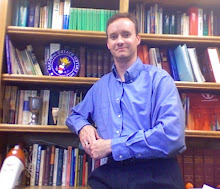Google Maps and Bible sites
I recently discussed with others whether bible software companies should consider opening up their API's to allow for 3rd party innovation. Quite frankly, the first one that does will quickly overtake the landscape, in a way similar to how Google Maps has gone from nothing to THE tool to use in such short time.
Look at this mashup of a Google map utility that displays satellite images of Jesus cities and provides scripture links. The example is very elementary but it demonstrates how one could create a map for an entire range of pedagogical and church uses. Some tips on how to get started can be found there.
It illustrates the tension between web applications and traditional computer apps. For example, Accordance has a nice Atlas module... unequalled in any other bible software on any platfom, however, I can't create in it a map where sites are linked to specific scripture texts I assign. It's simply not an option, and there's no way for me to customize it to do so. One can't even do pushpins, I don't think. We can't predict the uses folks might come up with, and if the Open Source model has taught us anything, is that innovation catches on fire in such an open API environment.
Still, I notice that the Accordance Map module is on sale right now... I'd grab it if you don't have it. And perhaps more customizing options will be coming in the future.
 in the Judean desert around the dead sea, presumably from the Bar Kochba revolt period. I find it interesting, and actually quite appropriate, that it was only 143 words into the article before we find the word "forgery(ies)".
in the Judean desert around the dead sea, presumably from the Bar Kochba revolt period. I find it interesting, and actually quite appropriate, that it was only 143 words into the article before we find the word "forgery(ies)".
 (Yes, I have a 3 year old daughter and learned some of my Spanish from
(Yes, I have a 3 year old daughter and learned some of my Spanish from 
